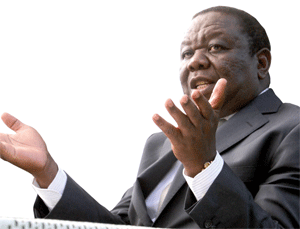
Prime Minister Morgan Tsvangirai’s MDC-T was reported in the press on Friday to have lined up international rallies aimed at wooing an estimated three million Zimbabweans living in the diaspora to “come back home and vote in the forthcoming general elections”, which President Mugabe is manoeuvring to schedule for March 2013.
Report by Geoffrey Nyarota
The MDC-T is reportedly working on this strategy despite the fact that the draft constitution categorically denies Zimbabweans in the diaspora the vote in elections held back at home.
It was reported that the MDC-T was planning to sell its election manifesto in the hope that most of the economic refugees scattered all over the globe would be persuaded to return home to cast their ballot.
Tsvangirai was also expected to brief the diaspora community on the current political situation in Zimbabwe, the constitution-making process and about the diaspora vote, or absence thereof, I would say.
Tsvangirai, who appears to have already embarked on this mammoth project, is to be accompanied by a high-powered delegation, comprising Tendai Biti, Nelson Chamisa, Lovemore Moyo, Sibusisiwe Bhuda-Masara and Costa Machingauta.
Tsvangirai was scheduled to address a rally in Johannesburg, South Africa, yesterday to kick off the tour before embarking on the world-wide tour. The trip will take him further afield to New Zealand, Australia, Canada, Botswana, the US and the United Kingdom, among other nations “where we have Zimbabweans”, according to Chamisa.
While the Zimbabwean diaspora community is now scattered in every corner of the world, the majority is based in South Africa. On a balance of probabilities, it is in this neighbouring country that the MDC-T campaign is likely to achieve its greatest success.
- Chamisa under fire over US$120K donation
- Mavhunga puts DeMbare into Chibuku quarterfinals
- Pension funds bet on Cabora Bassa oilfields
- Councils defy govt fire tender directive
Keep Reading
But, as the Minister of Information Communication Technology, Chamisa will pertinently and eloquently testify that in today’s high-tech world it is much easier logistically, less expensive financially and much more effective practically to disseminate information in general and political campaign messages, in particular, through the internet than it is to address political party supporters physically attending political rallies.
The election manifesto and other political messages that the MDC-T wishes to disseminate to the diaspora community, can be transmitted in a matter of hours from the party’s information department, assuming that has not already happened. Facebook, Twitter and other social media were created for exactly that purpose.
On average, the majority of Zimbabweans living in the diaspora, especially those with an interest in political developments in their country, spend much time on the internet. What they do not know already about the constitution-making process may not be worth knowing after all.
NewsDay, The Daily News, The Herald, The Chronicle, The Standard and The Sunday Mail have collectively done a commendable job of keeping Zimbabweans adequately informed about political developments.
These publications all have internet versions for the benefit of diaspora readers. Loneliness makes Zimbabweans in the diaspora prisoners of the internet. MDC-T should know this.
In any case, the MDC-T has performed exceedingly well in elections held in 2000, 2002, 2005 and 2008 without the diaspora vote and without undertaking any expensive international tour by the party’s leadership. In the UK and the US, the need to work shifts in order to survive renders it difficult for many to find time to attend rallies in their millions to be educated on the politics at home. It is common knowledge that hundreds of thousands in those countries and in South Africa remain in those countries as illegal immigrants.
Even if they could afford the return trip to Harare, which many clearly cannot, they are not in a position to travel from their countries of current residence. It is also common knowledge that thousands of Zimbabweans fail to travel back home to bury parents and other loved ones because they simply cannot afford it or they do not have the required papers. The MDC-T and other parties should have campaigned for the diaspora population to be allowed to vote in situ.
The MDC-T appears to be under-estimating the capacity of Zanu PF to infiltrate the proposed rallies to bombard speakers with awkward questions about the source of funds to undertake such unprecedented political campaign itineraries and the source of funds to underwrite the Prime Ministers numerous and expensive marital escapades. It is erroneous, anyway, to assume that every Zimbabwean in the diaspora will vote for the MDC-T.
If the MDC-T now genuinely believes that a world tour is absolutely necessary in order to dislodge Zanu PF from power, then the former ruling party must be much stronger than what the former opposition party has been telling the electorate over the past three years or so.
Meanwhile, Zanu-PF is reported to be preparing to hold meetings country-wide to be addressed by the party’s politburo members to mobilise voters at home.











